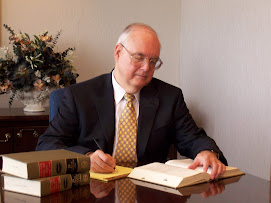Did you happen to see the April 13, 2009 article on WSJ.com? Below the caption the author states: "Many people die with nothing in order. Here's some help sorting it all out."
Usually when I see these tag lines I start figuring they will recite 2 or 3 common errors that keep getting rehashed in the media. This article, however, is a little different. The main theme was keeping things in order. Suzanne Barlyn, the writer, started by stating that one large problem is missing wills. How right she is. Almost every day an attorney will post on a lcoal listserve a missing will or trust. The family believes the loved one created a will but they cannot find it. Is it sitting in a safe-deposit box? Lost in boxes? While "lost in boxes" is certainly a misnomer, by the time you sort through a lifetime of accumulation, probate should have been started long ago. Bottom-line: keep the Will handy and easily found. The family may need quick access to the estate to pay bills, funeral expenses, etc.
The writer then talked about the financial records. On many occasions family members bring into our office boxes, sometimes bags, of records, trying to sort statements dating back 20-30 years from current statements. What do you do about old statements besides contact the company and ask if the account still exists? This takes a lot of time and very often fruitless. Sometimes we just have to look at current tax returns and watch the mail to see what comes in, often after the first of the year. Her suggestion, and mine as well, is keep it organized. Keep current statements organized and destroy old statements and records that are no longer needed.
The article then talks about dividing up the personal property. I don't get why it is, but family members seem to really go at each other over these often sentimental but valueless items. Arizona recognizes personal property lists that everyone can draw up on their own and list who should receive which personal items (must be personal property and no cash). This settles a lot of issues before the family member dies. Some clients will even ask their children which items they want, decide what is fair, then fill out the sheets. This is a great idea.
Taxes. The last issue raised in the article discusses ill persons who fail to file returns leaving the remaining executor or successor trustees to fill in the gaps and complete the returns. If we have a hard enough time doing our own taxes, imagine trying to figure out someone else? Especially if the paperwork is everywhere and cumulative. Sometimes this issue cannot be avoided however. Fortunately, the IRS can sometimes be understanding. If taxes are owed, especially prior years, take your time getting the information together, notify the IRS of the death, and they may forgive the penalties on the late filing and late payment (not the interst, just the principal).
So I guess my point is other than getting your estate papers done, keep it in order. It will have an impact, positive or negative, on the family when they are dealing with a lot of their own emotions and problems after you are gone.
Tuesday, April 14, 2009
Subscribe to:
Post Comments (Atom)

No comments:
Post a Comment